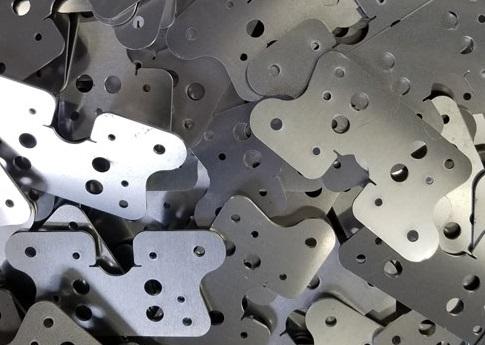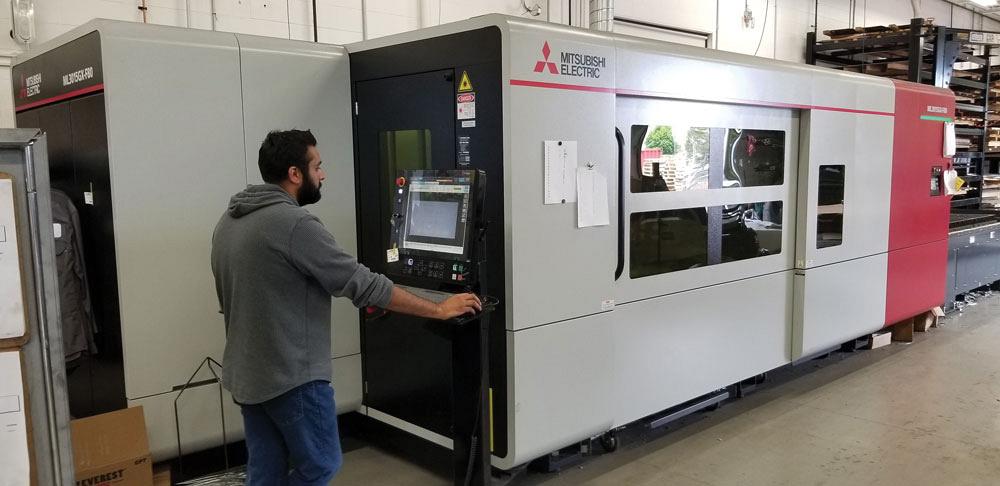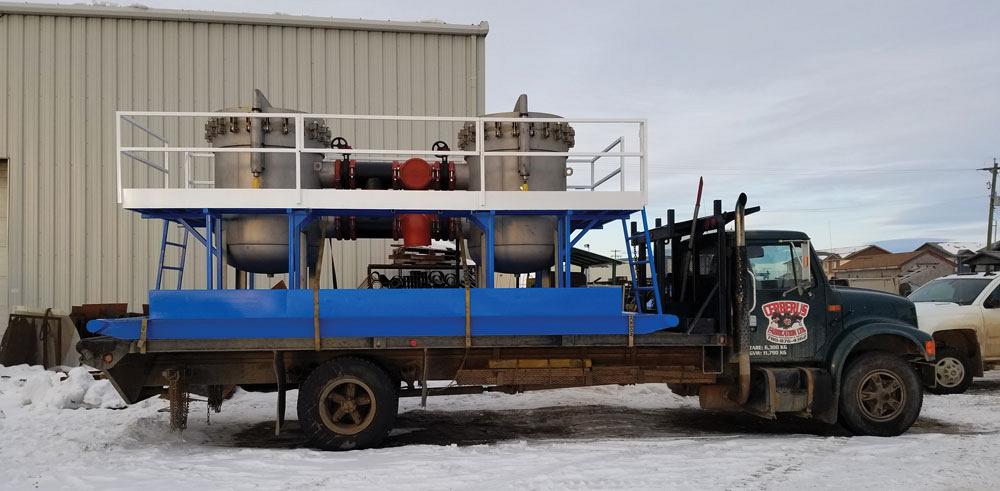- FMA
- The Fabricator
- FABTECH
- Canadian Metalworking
Canadian job shops find ways to stand out in the crowd
The last few years have pushed fabricators to expand their competitive advantage
- July 28, 2022
- Article
- Fabricating
These last few years have been a struggle. Market conditions have been volatile. The pandemic forced an economic standstill. And the recovery has seen labour and resource shortages. It hasn’t been easy. But job shops across Canada have found ways to not only survive but rebound from these challenges.
Each shop has its own unique way of doing things and its own lens in which it sees itself in the greater manufacturing sector. Some shops see downtime as an opportunity to invest or attempt to streamline production, while others just do their best to produce quality components for its customers.
These last few years have forced some job shops to close their doors for good. But for those that were able to weather the storm, they’ve learned some important lessons that they will carry with them into the future.
Streamlining In Orangeville
Mill Finish Industries was barely a year into business when the pandemic hit. Owner JR Sehmbi had branched out on his own after a number of years in the family business at Millomat in Mississauga. Armed with a 3-kW laser, he quickly found a niche in producing aftermarket parts for the automotive industry while picking up other work for the aerospace and elevator industries. The pandemic itself created a stream of jobs producing sneeze guards, social distancing signs, and medical-grade steel tanks.
But as a new job shop, it was probably inevitable that jobs would shift.
"The pandemic-related work disappeared pretty much overnight, which was not a surprise," said Sehmbi. "But other work just boomed. We’d gotten involved in outdoor site furniture and those POs and RFQs started rolling in steadily."
Other kinds of customers who couldn’t find shops to do their work started approaching him for different work as well.
"I had customers coming to me who needed ¼- to ½-in. plate cut and bent for components in the mining and agriculture industries," he said. "Suddenly I had customers who were from outside of the Brampton/Mississauga area where our shop was." The Mill Finish shop in Brampton was a tight 2,900 sq. ft. of working space. With a broader range of customers, Sehmbi decided to look further afield for more space. That’s when he found a precision machine shop owner looking to sell 10,000 sq. ft. in Orangeville, Ont. With customers in Alliston, Barrie, Sudbury, and other points north of Brampton, Sehmbi knew he could work with the space.
The broadening scope of work demanded new machine investments as well.
"With heavier plate, our 3-kW fibre really couldn’t keep up," he said. "The faster you cut, the more money you make. Speed and accuracy were important to us as well."
Sehmbi invested in a Mitsubishi GX-F Advanced 8-kW fibre laser table.
"With the AI and augmented reality on this machine, we’ve cut our rejection rate by 80 per cent," he said. "Our laser rejection rate without operator error is maybe 1 per cent, if that. We’re regularly cutting 1-in. aluminum, 1-in. stainless, and 1-in. mild steel on it." Mill Finish is scheduled to receive a load/unload system with an eight-shelf tower to accompany the laser shortly. "We wanted to get the shop set up and running before adding the automation. Now we’re ready."
In combination with the laser, Sehmbi invested in a Diamond BH 25040 ball screw hybrid brake to handle larger parts. The shop already has a 50-ton, 4-ft. electric brake to handle smaller jobs.
As it is for everyone now, the price of gas and shipping has become a concern for Sehmbi as well. So, when he found a cartage company for sale in Orangeville, it made sense to invest to secure his shop’s needs.
"We had to implement something, knowing that our Mississauga, Brampton, and Toronto customers would be affected by our move," he said. "We have the original owner of the cartage company managing that side of the business. We had to downsize its operations to make it manageable, but we maintain about 10 per cent local business beyond the needs of our shop. With a dedicated truck that goes out to Timmins every week, it’s good to have control of our needs that way."
Sehmbi wants to control as much as he can in his processes without overstaffing. He currently has a team of 17 and hopes to keep that steady with further innovations. In May, for instance, he took delivery of an ABB robot for automated welding operations.
"We have around 10 to 12 products that we make pretty consistently, so with the right jig system, that will create a lot of efficiencies in the welding area," he said.
Next up is a potential investment in a powder coating line in combination with his brother at Millomat and one other company. "It just doesn’t make sense to outsource that work anymore," he said.
The new shop is certainly helping Sehmbi streamline work.
"We are still lean on inventory, but in terms of our production we are able to produce and stock items, particularly for the site furniture industry, so that we can deliver within two to four weeks rather than six to eight weeks," he said. "We now have the manpower and the space—four dedicated welding bays, a 2,500-sq.-ft. storage area, and a dedicated quality control space. It is making it possible to streamline the company."
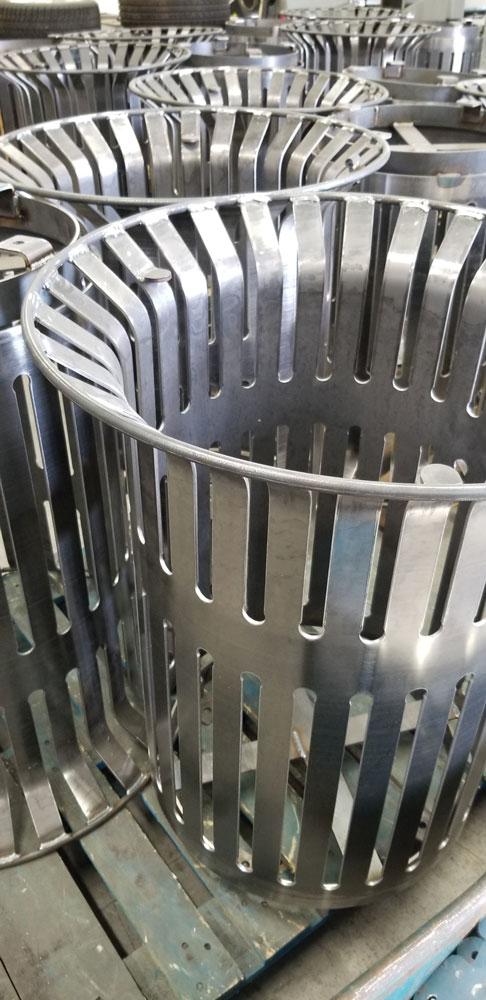
A big part of Mill Finish’s business is in outdoor site furniture but the capabilities of the shop’s new laser and press brake has Sehmbi expanding into areas like mining and agriculture. Mill Finish Industries
Turning a Downturn Into Opportunities in Lantz
Three generations of Molnars have spent the greater part of 50 years turning their passion for fabricating and welding into a thriving business that serves the forestry industry in Atlantic Canada.
George Molnar, along with his wife Rose, first started Molnar Welding in 1970 in Lantz, Nova Scotia. After immigrating to Canada from Hungary in 1956, George had taken on a number of different jobs, but he soon realized that a career in welding was just the ticket and went to school to learn the trade.
His son, Winston, would follow in his footsteps in the mid 1980s by taking up welding training. After several years of experience at different shops, Winston joined his father’s company. After a long period of growth and success, the father-son duo incorporated the shop as a limited company, purchased a local machine shop, specialized in the sawmill sector, and the rest is history.
"We’ve seen so much progression over the years, especially as it relates to building sawmill equipment and products for recycling plants," said Josh Molnar, operations manager, Molnar Welding. "Today we have 25 employees, a customer base of over 300, and are still growing."
The majority of the work the shop takes on is centred on the forestry sector. Molnar Welding designs, fabricates, and installs sawmill equipment for some of the major players in the industry—Harry Freeman and Sons in Greenfield, N.S.; Ledwidge Lumber in Enfield, N.S.; Mactara Ltd. in Upper Musquodoboit, N.S.; Taylor Lumber in Middle Musquodoboit, N.S. and is currently in the middle of a project reworking the sawmill at Elmsdale Lumber in Elmsdale, N.S. Outside of the province the shop has built the sawmill at Cottles Island Lumber in Summerford, N.L.; and at Delco Forest Products in West Branch, N.B., the shop helped install a 460-ft.-long automated continuous dry kiln.
"We also do some work for Regroup and its recycling plants along with HRM, Miller Group, and the Shaw Group," said Molnar. "One of the biggest challenges we’ve faced in recent months was the closure of Northern Pulp, in New Glasgow, N.S. It really left all the sawmills in a bad position, and many have struggled to find a place to send their bioproducts and chips. This can lead to a serious backlog and production issues that then directly affect us."
And, of course, the pandemic made a significant impact on the shop’s business. At the beginning it was a bit slow going, but then it seemed like the forestry sector experienced a boom where everyone wanted to rebuild or expand. The increase in lumber prices also helped the forestry sector regain some of that lost revenue from the pulp mill closure.
Molnar Welding has vast experience developing various sawmill projects. The shop designs the equipment in-house, fabricates the equipment, and assembles all components on site. For example, the Cottles Island project was entirely turnkey, and the shop was able to build an entire sawmill line from the ground up.
The downturn in the sector and the pandemic provided the shop with a unique opportunity.
"We decided that this was the perfect time to update and upgrade our equipment," said Molnar. "When things slowed down, we wanted to position ourselves to hit the ground running when things did pick back up again. We reached out to Rideout Tool and purchased a number of new Durma machines. We really lucked out because the new equipment really helped expand our capabilities for our customers in this sector."
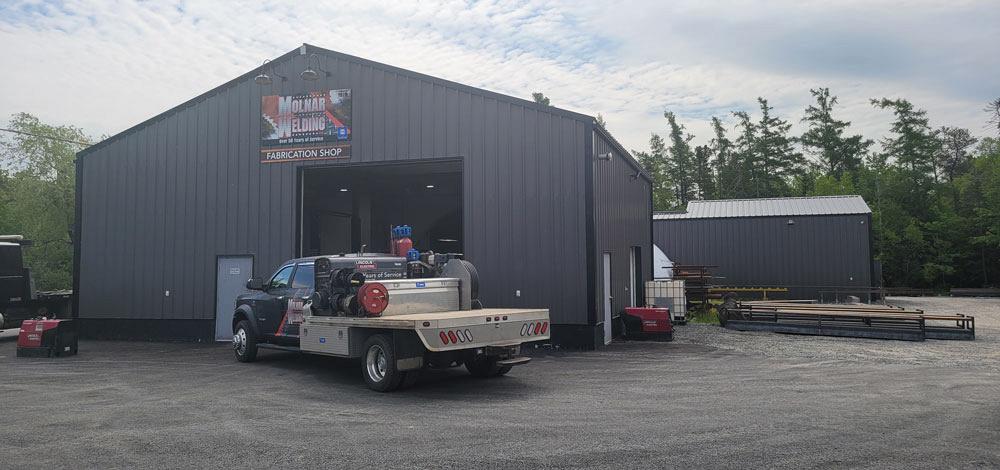
The Molnar family has taken on fabricating and welding projects for saw mills across Atlantic Canada for over 50 years. Molnar Welding
The 15,000-sq.-ft. facility now includes mostly brand new equipment, including a 440-ton Durma CNC plate bender, Durma 1-in. by 10 ft. CNC plate roller, and Durma ½-in. by 10-ft. plate shear. For smaller jobs, the shop has a ¼-in. by 10-ft. plate shear and a 250-ton plate bender. Molnar also invested in a Messer Evolution 300 XPR plasma table with bevel head along with a range of weld equipment. It also is equipped with a full machine shop including a large lathe with a 24-in. swing, a line boring machine for when a project requires line boring on-site, and 17 service trucks.
"With all the new equipment investment, our production is up and we are able to provide higher quality products," said Molnar. "We are also able to perform higher capacity functions with larger materials. The plasma table is able to cut up to 3-in.-thick materials. We are one of only three shops on the East Coast, which include Irving Shipyard and Russell Metals, to have a table like this. Our equipment and production capabilities really provide a competitive advantage."
Molnar believes as long as the economy continues the way that is has, the shop will continue to see expanded growth. As of right now the shop is extremely busy and booked solid for the next couple of years.
"We got just a lot of projects on the go," said Molnar. "There are also a few that we expect to be awarded in the near future. Supporting the pulp mill in the past allows us the opportunity to potentially work with Northern Pulp in the years to come on its $180 million facility update. It seems that everyone in this industry is doing upgrades. If you are not busy, I think you are doing something wrong. Our shop has been around for over 50 years and we are still seeing so much growth and opportunity. It’s a really great position to be in. But our family has worked hard to be in this position. There are not a lot of companies in our region that do what we do. It’s specialized and we really focus on being the best."
Maintaining Strong Community Ties in Grande Prairie
What started out a single-man operation turned into a thriving fabricating business in Grande Prairie, Alta. Cerberus Fabrication was started in 2015 when Clayton Siemens decided he wanted to leave his current job behind and strike out on his own.
With years of experience in the fabricating and welding sectors, Siemens reached out to friend and current partner Steven Sawchuk, who already had an established fabrication shop. Sawchuk helped Siemens set up and launch his own shop on a friend’s acreage, taking on small projects and doing everything he could to build relationships with customers in the community.
It was going really well until market and industry downturns made it difficult for Siemens.
"It was a bit touch and go at the beginning," said Siemens. "I started out doing a lot of truck and trailer repairs, taking on any project I could find. That has really stuck with me from the onset, being willing to take on just about anything."
When Siemens’ previous employer shut down, he jumped at the chance to take over the vacant shop.
"This opportunity really helped me grow into the shop we are today," he said. "It was a better facility with better cranes and power sources than I was working with at the time. And when I sustained an injury, I really rethought the single-man operation and hired some employees. Ever since then, we’ve been growing."
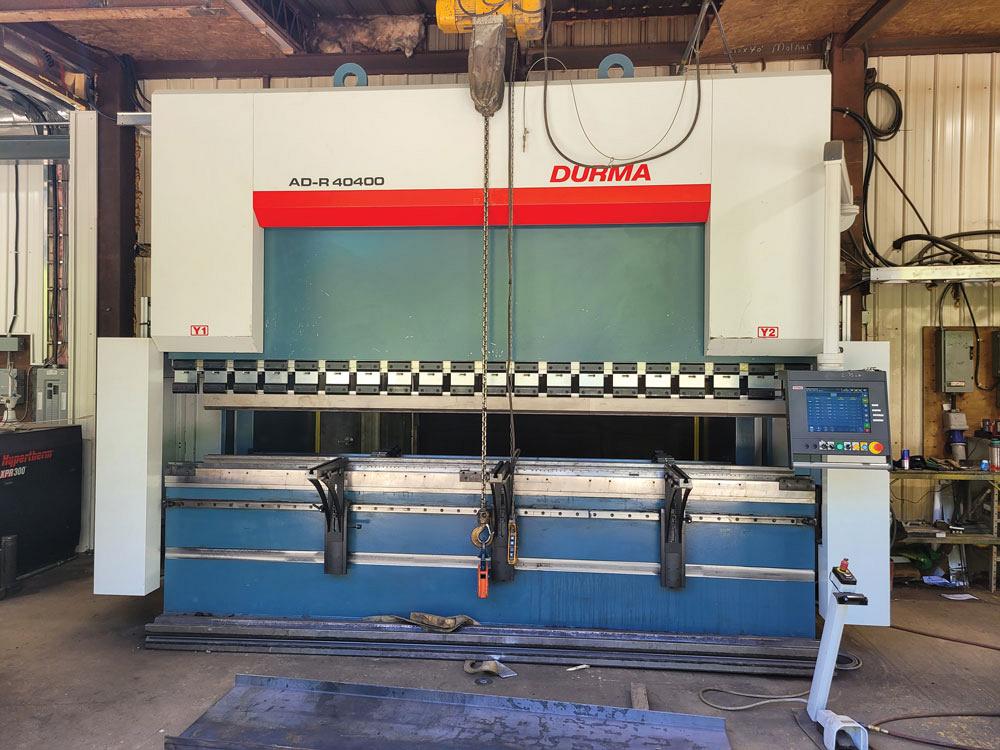
Molnar decided to invest in new Durma equipment, including a plate bender, roller, and shear, that really helped expand its capabilities for customers in the forestry sector. Molnar Welding
As a job shop, Cerberus takes on a lot of repair work and walk-in projects in its 5,200-sq.-ft. shop. Located near a residential area of Grande Prairie, the shop currently has 12 employees and includes a range of equipment including a lathe, milling machines, drill press, ironworker, saws, welders, and a plasma table.
"The last couple years in the COVID era we were able to get through without going backwards, which was a big deal," said Siemens. "And while we didn’t make very much money, we didn’t go in the hole either. We held our own, and there’s been a lot of shops that didn’t make it through those times. Now we’re coming out of the pandemic, and the economy is very busy, but we’re seeing a shortage of manpower and resources. We’re actively looking to add people to our team but it’s very difficult to find any available workers."
Siemens credits the shop’s ability to get through tough times to the team’s willingness to take on any job that comes in the door. And while not all projects are a good fit for Cerberus, the shop tries to remain as versatile as it can, taking on oil patch work, repair work for farmers and truckers, and general projects.
"We specifically don’t specialize in any one area and try to be as general as we can while still retaining a high level of quality and customer service," said Siemens. "Our customers call us with an emergency, we make things happen. We’re very resourceful when it comes to finding things for our customers, and even if it’s not something we can do for them workwise, we love networking and bringing people in the community together. I enjoy helping find ways to make our customers better because, in turn, it makes us better and then everyone grows. The circle is fairly small up here and that’s what makes it work."
Most of Cerberus’ customers have come from relationships that it has built within the community. It’s that community focus that has helped drive shop the culture within the shop. For Siemens, relationships are the key to success, and he tries to implement a family-oriented atmosphere both on the shop floor and with all the customers that come into the shop.
One of the challenges of being agile and not specializing in any one sector is that the team needs to evolve constantly to meet everchanging conditions and demands. What works for one customer doesn’t always work for another, and as technology is changing, the team needs to change with it.
"There’s so much political involvement in the industries that we’re involved in that it can be difficult to forecast or have any idea of what the future holds," said Siemens. "We don’t always know what we’re doing from one week to the next; we don’t have a lot of long-term projects on the books. For us, it’s a lot of day-to-day stuff. That means a lot of organizing, changing on the fly, and being adaptable because priorities change. We just kind of roll with the punches each and every day, but I do think the future looks fairly bright for us. And, I’m confident in my team and our shop’s ability to meet customers’ needs going forward."
Cerberus Fabrication, www.cerberusfabrication.ca
Mill Finish Industries, www.millfinish.ca
Molnar Welding, www.molnarwelding.ca
subscribe now


Keep up to date with the latest news, events, and technology for all things metal from our pair of monthly magazines written specifically for Canadian manufacturers!
Start Your Free Subscription- Trending Articles
FMA Annual Meeting: Ingenuity still key with tech innovations

Automotive industry gets back on track

The 22nd annual Great Designs in Steel symposium returns May 22
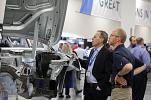
Torch made for welding thin, conductive sheet metal

Compact swing chamber shot blast machine features robotic workpiece handling
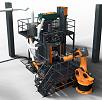
- Industry Events
Automate 2024
- May 6 - 9, 2024
- Chicago, IL
17th annual Joint Open House
- May 8 - 9, 2024
- Oakville and Mississauga, ON Canada
MME Saskatoon
- May 28, 2024
- Saskatoon, SK Canada
CME's Health & Safety Symposium for Manufacturers
- May 29, 2024
- Mississauga, ON Canada
DiPaolo Machine Tools Open House 2024
- June 4 - 5, 2024
- Mississauga, ON Canada













